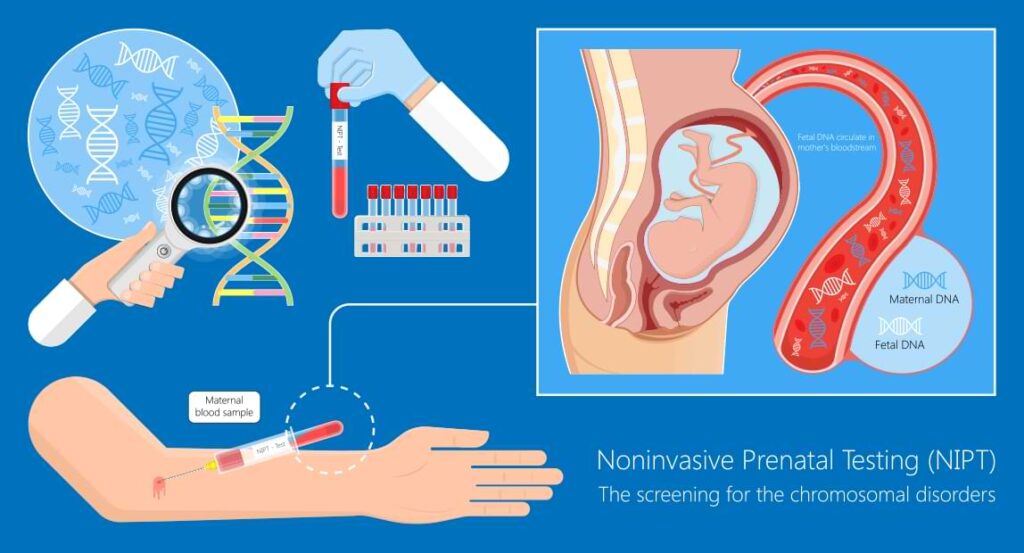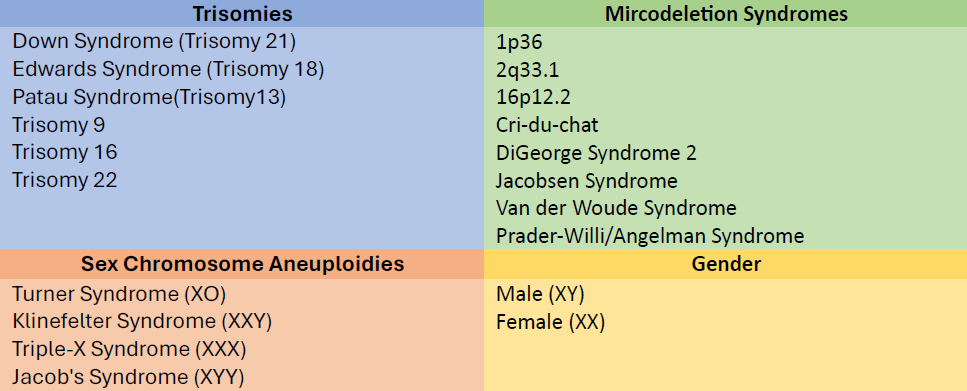Non-Invasive Prenatal Testing (NIPT) – A Breakdown
Non-Invasive Prenatal Testing, commonly referred to as NIPT, is a cutting-edge technology used in prenatal screening. Unlike traditional procedures such as amniocentesis and chorionic villi sampling (CVS), which carry a risk of miscarriage, NIPT offers a non-invasive alternative. This technique involves a simple blood draw from the expectant mother, containing cell-free fetal DNA (cffDNA) that can be scrutinized for genetic disorders. Typically conducted between the 10th and 12th weeks of gestation, NIPT is suitable for various pregnancy types, including single, twin, and IVF pregnancies. It can also be performed later in pregnancy, especially when concerns arise after the 18–20 week morphology ultrasound, raising the risk of conditions like trisomy 21, trisomy 18, or trisomy 13.

Detecting Genetic Abnormalities with NIPT
NIPT stands out as an exceptionally accurate screening test, boasting a sensitivity rate of over 99.9% for identifying conditions like Down Syndrome, Edwards Syndrome, and Patau Syndrome. One of its significant benefits is the substantial reduction in the number of invasive diagnostic procedures required by expectant mothers.

NIPT can detect a range of genetic abnormalities, including:
Down Syndrome (Trisomy 21)
Edwards Syndrome (Trisomy 18)
Patau Syndrome (Trisomy 13)
Trisomy 9
Trisomy 16
Trisomy 22
Microdeletion Syndromes like 1p36, 2q33.1, 16p12.2, Cri-du-chat, DiGeorge Syndrome 2, Jacobsen Syndrome, Van der Woude Syndrome, Prader-Willi/Angelman Syndrome
Sex Chromosome Aneuploidies such as Turner Syndrome (XO), Klinefelter Syndrome (XXY), Triple-X Syndrome (XXX), and Jacob’s Syndrome (XYY)
NIPT and Ethical Debates in Muslim Communities
The utilization of NIPT can initiate important ethical discussions, particularly when it leads to decisions about pregnancy termination due to the presence of a genetic disorder. In Islam, the sanctity of life is highly valued, and abortion is generally considered permissible only when the mother’s life is in danger or under specific circumstances. The use of NIPT may trigger conversations within Muslim communities regarding the moral permissibility of selective abortion based on genetic abnormalities.
An Islamic Fiqh Council statement issued during its twelfth session held in Makkah al-Mukarramah on 15 Rajab 1410 AH (10 February 1990 CE) stated that abortion may be permissible if a committee of trustworthy doctors confirms severe deformities in the fetus that cannot be treated, and continuing the pregnancy would lead to unbearable suffering for the child and family. This decision must be made before the pregnancy reaches 120 days. After 120 days, abortion is generally not allowed, unless a medical report from a council of trustworthy specialist doctors confirms that continuing the pregnancy poses a risk to the mother’s life. In this case, abortion may be permissible, irrespective of whether the fetus is deformed or not, to prevent the greater harm.
It’s essential to understand that interpretations of Islamic teachings on prenatal testing and abortion may vary among different Muslim scholars and communities. Some may hold permissive views, while others may maintain conservative perspectives. Seeking guidance from religious authorities or scholars who can offer advice in line with specific beliefs and interpretations is crucial. NIPT provides valuable information about the fetus’s health, aiding informed decisions about the pregnancy. Therefore, Muslim individuals and families should be encouraged to seek medical advice and genetic counseling to fully comprehend the implications of the test results before making any decisions.
References
[1] http://muftiwp.gov.my/ms/artikel/al-kafi-li-al-fatawi/663-al-kafi-659-hukum-gugurkan-janin-bagi-wanita-yang-sibuk-berkerja
[2]https://muftiwp.gov.my/ms/artikel/al-kafi-li-al-fatawi/3187-al-kafi-1145-adakah-dibolehkan-untuk-mengugurkan-kandungan-yang-berusia-4-bulan#_ftn1
[3] American College of Obstetricians and Gynecologists Committee on Genetics. 2012. Opinion no. 545: Noninvasive prenatal testing for fetal aneuploidy. Obstetrics and Gynecology 120(6): 1532–4. http://dx.doi.org/10.1097/01.AOG.0000423819.85283.f4
Published by: Dr. J-








